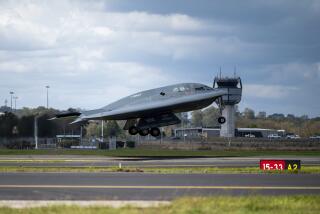Analysis: U.S. engagement in Mideast conflicts may complicate Iran nuclear talks
- Share via
The U.S. air assault in Iraq and American support for the Gulf Arab states’ attacks in Yemen are threatening to upend Washington’s difficult relationship with Iran at an especially difficult moment.
With a deal to limit Iran’s controversial nuclear program possibly in view, Tehran’s cooperation is essential to complete an agreement that could be one of President Obama’s chief foreign policy accomplishments.
But a major risk is that the U.S. interventions in the two Mideast countries will sharpen the opposition of Iranian hard-liners toward the United States generally in the region, and to the nuclear deal in particular.
Iran’s supreme leader, Ayatollah Ali Khamenei, has sought to contain their opposition to the nuclear deal.
But the hard-line mullahs and Iran’s Revolutionary Guard Corps see the U.S. involvement in the region as a chief threat to Iran’s aspirations -- and they fear that the nuclear deal, by opening Iran to the outside world, could threaten their power and economic interests in the country.
Obama has already acknowledged publicly that he considers the resistance of Iranian conservatives a major threat to the deal, and the U.S. relationship with Iran has only been complicated by the recent military actions.
In Yemen, the U.S. is supporting Saudi Arabia-led airstrikes against Iranian-backed Houthi militias. In Iraq, U.S. airstrikes in Tikrit this week have been aimed at minimizing Iran’s own military support for the Iraqi government against Islamic State militants.
The recent U.S. moves in Yemen and Iraq reveal the mounting pressures drawing the Obama administration further into the unstable and violent region despite the White House’s determined effort to limit its role.
U.S. officials feel they have had little choice but to take a greater military role in Iraq, simply to maintain the influence they have with the government of Iraqi Prime Minister Haider Abadi.
Iran and its Shiite militia allies have been increasingly at the center of action against Islamic State militants, and without a more aggressive U.S. campaign the administration risked being marginalized in Iraq, a country where thousands of U.S. soldiers lost their lives.
The administration has sought to limit its involvement in Yemen. U.S. officials have worked hard to find a diplomatic solution to the many-sided civil war. They have played down, until recently, the extent of Iranian military support for the Houthis.
But Saudi Arabia and the smaller Persian Gulf Arab states are historical American allies. They see the Shiite threat on the Arabian Peninsula as existential, at a time when, in their view, Iran has been gaining influence in Iraq, Syria, Lebanon and Bahrain.
The U.S. relies heavily on Saudi Arabia in many ways, including to provide enough oil output to make possible the international sanctions regime that has brought Iran to the negotiating table. The United States also has an imperative to prevent Yemen from becoming a lawless state where Al Qaeda in the Arabian Peninsula, the most dangerous Al Qaeda franchise, could flourish.
The Arab states’ air campaign in Yemen may not be nearly enough to accomplish their objectives. The Saudis have in the past been the major force and most important source of outside money for the country, but they have been unable to count on their old ties and their influence has waned.
The Houthis, meanwhile, are aligned with former president Ali Abdullah Saleh, who has important tribal and military ties.
More to Read
Sign up for Essential California
The most important California stories and recommendations in your inbox every morning.
You may occasionally receive promotional content from the Los Angeles Times.











